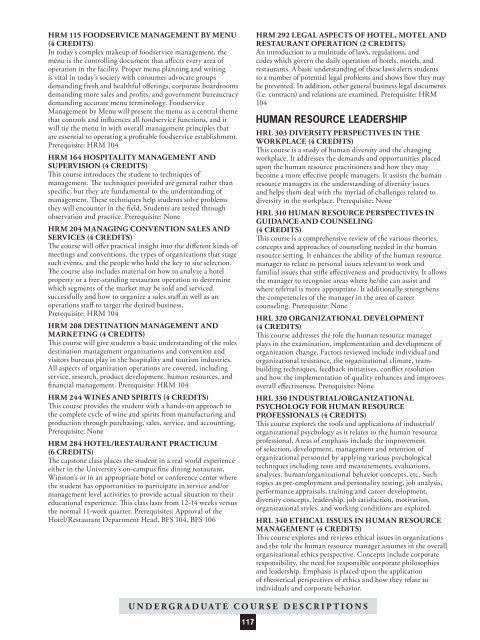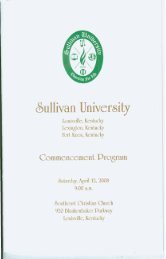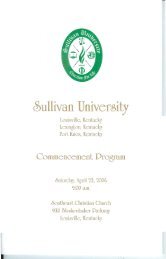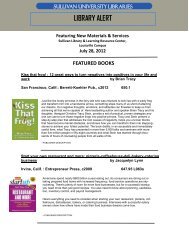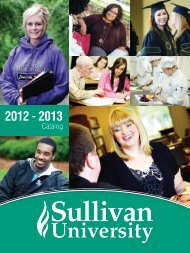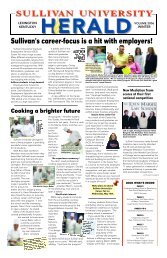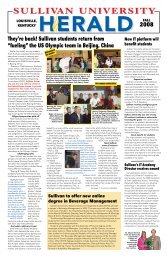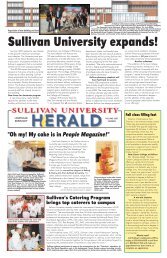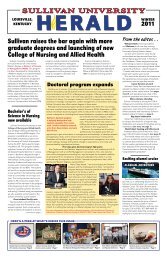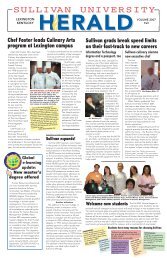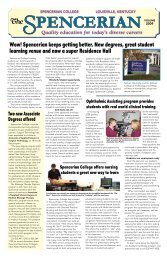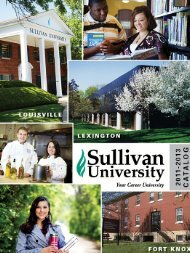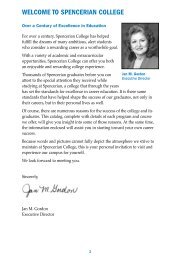Undergraduate Course Descriptions - Sullivan University | Library
Undergraduate Course Descriptions - Sullivan University | Library
Undergraduate Course Descriptions - Sullivan University | Library
Create successful ePaper yourself
Turn your PDF publications into a flip-book with our unique Google optimized e-Paper software.
HRM 115 FOODSERVICE MANAGEMENT BY MENU<br />
(4 CREDITS)<br />
In today’s complex makeup of foodservice management, the<br />
menu is the controlling document that affects every area of<br />
operation in the facility. Proper menu planning and writing<br />
is vital in today’s society with consumer advocate groups<br />
demanding fresh and healthful offerings, corporate boardrooms<br />
demanding more sales and profits, and government bureaucracy<br />
demanding accurate menu terminology. Foodservice<br />
Management by Menu will present the menu as a central theme<br />
that controls and influences all foodservice functions, and it<br />
will tie the menu in with overall management principles that<br />
are essential to operating a profitable foodservice establishment.<br />
Prerequisite: HRM 104<br />
HRM 164 HOSPITALITY MANAGEMENT AND<br />
SUPERVISION (4 CREDITS)<br />
This course introduces the student to techniques of<br />
management. The techniques provided are general rather than<br />
specific, but they are fundamental to the understanding of<br />
management. These techniques help students solve problems<br />
they will encounter in the field. Students are tested through<br />
observation and practice. Prerequisite: None<br />
HRM 204 MANAGING CONVENTION SALES AND<br />
SERVICES (4 CREDITS)<br />
The course will offer practical insight into the different kinds of<br />
meetings and conventions, the types of organizations that stage<br />
such events, and the people who hold the key to site selection.<br />
The course also includes material on how to analyze a hotel<br />
property or a free-standing restaurant operation to determine<br />
which segments of the market may be sold and serviced<br />
successfully and how to organize a sales staff as well as an<br />
operations staff to target the desired business.<br />
Prerequisite: HRM 104<br />
HRM 208 DESTINATION MANAGEMENT AND<br />
MARKETING (4 CREDITS)<br />
This course will give students a basic understanding of the roles<br />
destination management organizations and convention and<br />
visitors bureaus play in the hospitality and tourism industries.<br />
All aspects of organization operations are covered, including<br />
service, research, product development, human resources, and<br />
financial management. Prerequisite: HRM 104<br />
HRM 244 WINES AND SPIRITS (4 CREDITS)<br />
This course provides the student with a hands-on approach to<br />
the complete cycle of wine and spirits from manufacturing and<br />
production through purchasing, sales, service, and accounting.<br />
Prerequisite: None<br />
HRM 284 HOTEL/RESTAURANT PRACTICUM<br />
(6 CREDITS)<br />
The capstone class places the student in a real world experience<br />
either in the <strong>University</strong>’s on-campus fine dining restaurant,<br />
Winston’s or in an appropriate hotel or conference center where<br />
the student has opportunities to participate in service and/or<br />
management level activities to provide actual situation to their<br />
educational experience. This class lasts from 12-14 weeks versus<br />
the normal 11-week quarter. Prerequisites: Approval of the<br />
Hotel/Restaurant Department Head, BFS 104, BFS 106<br />
117<br />
HRM 292 LEGAL ASPECTS OF HOTEL, MOTEL AND<br />
RESTAURANT OPERATION (2 CREDITS)<br />
An introduction to a multitude of laws, regulations, and<br />
codes which govern the daily operation of hotels, motels, and<br />
restaurants. A basic understanding of these laws alerts students<br />
to a number of potential legal problems and shows how they may<br />
be prevented. In addition, other general business legal documents<br />
(i.e. contracts) and relations are examined. Prerequisite: HRM<br />
104<br />
HUMAN RESOURCE LEADERSHIP<br />
HRL 303 DIVERSITY PERSPECTIVES IN THE<br />
WORKPLACE (4 CREDITS)<br />
This course is a study of human diversity and the changing<br />
workplace. It addresses the demands and opportunities placed<br />
upon the human resource practitioners and how they may<br />
become a more effective people managers. It assists the human<br />
resource managers in the understanding of diversity issues<br />
and helps them deal with the myriad of challenges related to<br />
diversity in the workplace. Prerequisite: None<br />
HRL 310 HUMAN RESOURCE PERSPECTIVES IN<br />
GUIDANCE AND COUNSELING<br />
(4 CREDITS)<br />
This course is a comprehensive review of the various theories,<br />
concepts and approaches of counseling needed in the human<br />
resource setting. It enhances the ability of the human resource<br />
manager to relate to personal issues relevant to work and<br />
familial issues that stifle effectiveness and productivity. It allows<br />
the manager to recognize areas where he/she can assist and<br />
where referral is more appropriate. It additionally strengthens<br />
the competencies of the manager in the area of career<br />
counseling. Prerequisite: None<br />
HRL 320 ORGANIZATIONAL DEVELOPMENT<br />
(4 CREDITS)<br />
This course addresses the role the human resource manager<br />
plays in the examination, implementation and development of<br />
organization change. Factors reviewed include individual and<br />
organizational resistance, the organizational climate, teambuilding<br />
techniques, feedback initiatives, conflict resolution<br />
and how the implementation of quality enhances and improves<br />
overall effectiveness. Prerequisite: None<br />
HRL 330 INDUSTRIAL/ORGANIZATIONAL<br />
PSYCHOLOGY FOR HUMAN RESOURCE<br />
PROFESSIONALS (4 CREDITS)<br />
This course explores the tools and applications of industrial/<br />
organizational psychology as it relates to the human resource<br />
professional. Areas of emphasis include the improvement<br />
of selection, development, management and retention of<br />
organizational personnel by applying various psychological<br />
techniques including tests and measurements, evaluations,<br />
analyses, human/organizational behavior concepts, etc. Such<br />
topics as pre-employment and personality testing, job analysis,<br />
performance appraisals, training and career development,<br />
diversity concepts, leadership, job satisfaction, motivation,<br />
organizational styles, and working conditions are explored.<br />
HRL 340 ETHICAL ISSUES IN HUMAN RESOURCE<br />
MANAGEMENT (4 CREDITS)<br />
This course explores and reviews ethical issues in organizations<br />
and the role the human resource manager assumes in the overall<br />
organizational ethics perspective. Concepts include corporate<br />
responsibility, the need for responsible corporate philosophies<br />
and leadership. Emphasis is placed upon the application<br />
of theoretical perspectives of ethics and how they relate to<br />
individuals and corporate behavior.<br />
UNDERGRADUATE COURSE DESCRIPTIONS


